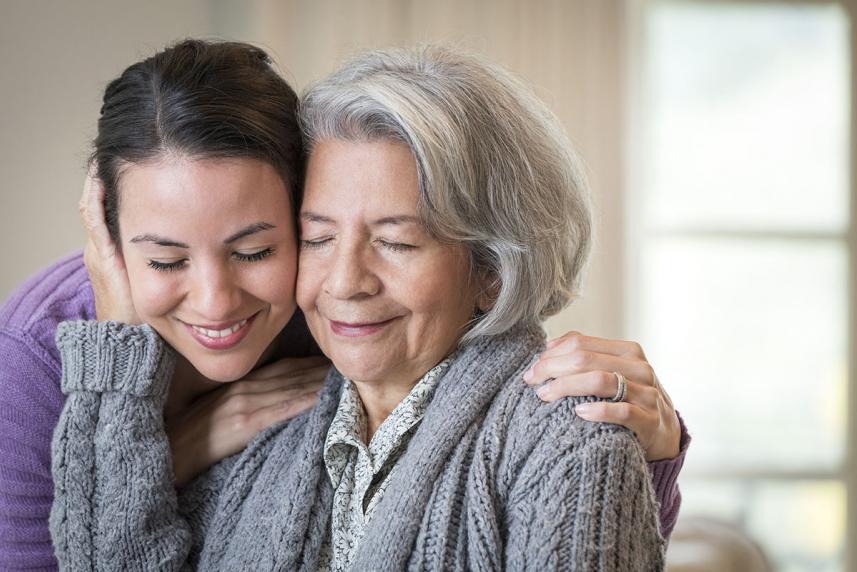
Find in-network specialists near you.
From making meals to simply listening, find out the many ways to provide support and help right now.

When someone you love — a family member or a close friend — is diagnosed with cancer, it’s normal to feel a swell of emotions. Fear, anger, sadness, determination can all come to mind.
Approximately 2 million people in the United States will be diagnosed with cancer in 2023, according to the National Cancer Institute. Even though that number seems daunting, there is one more emotion to consider: hope.
Today, cancer diagnoses and outcomes are not as dire as they seemed in the past, says Amy Clossick-Roudebush, R.N., B.S.N. She’s a nurse and case manager at Blue Cross and Blue Shield of Kansas City (Blue KC) who specializes in oncology. “Cancer is a very scary diagnosis, but it’s not the same diagnosis that it was 20 years ago,” she says. “We have so many treatment options available now, that it often becomes more of a chronic illness.”
But going through treatment can still take a toll on a patient’s physical and emotional health.
There are many ways you can make your loved one feel cared for and supported. Here’s a list of useful steps you can take to help ease their worries and support their care journey.
It can help to spend some time online learning as much as you can about their cancer diagnosis. You want to be armed with resources so that you can support your friend or loved one. “Having correct, accurate information about the cancer can help lower fear and anxiety for both of you,” says Clossick-Roudebush.
Be sure to visit reputable sites that provide the most up-to-date information, such as:
American Cancer Society
National Cancer Institute
American Society of Clinical Oncology (Cancer.net)
National Comprehensive Cancer Network
Any kind of support can be meaningful. A 2019 study showed that cancer patients who have strong emotional support can better cope with their disease, and even have a better quality of life during treatment.

Find in-network specialists near you.
Your loved one’s health is a top priority. You have a lot of options for helping them feel better during treatment:
If it’s your spouse or an immediate family member who has cancer, expect roles to change at home. For example, other family members might need to take over household duties. “These tasks may be too difficult for your loved one to keep up with during treatment,” says Clossick-Roudebush.
It’s a good idea to recruit friends, neighbors and other family members to pitch in. Many people want to help a friend who’s facing a difficult time, according to the American Cancer Society. You can set up an online calendar, for example, so that people can volunteer to do various chores and errands as needed.
When someone is diagnosed with cancer, people around them may shy away from hard conversations. But it’s important to be there for them when they want to talk.
Allow your loved one to bring up the topic of cancer themselves and steer the conversation in the way they want to, advises the American Society of Clinical Oncology. There will be days when they’re angry and sad, and days when they’re filled with hope. Let them feel their feelings. If you’re not sure what to say, a simple “I’m here for you” can be reassuring.
On other days, they may want to talk about anything but their cancer. You could chat about the latest episode of their favorite show, books, sports — anything that gets them excited.
Maybe you aren’t the caregiver, just a close friend or family member. If so, offer support to the person doing the heavy lifting at home. Running errands for them can be very helpful. “Cancer patients can become immunocompromised, so it’s important that the caregiver stays healthy, which may mean avoiding big crowds,” explains Clossick-Roudebush. You can drive their kids to school, pick up supplies at the drugstore, or get groceries.
Another option is to give the caregiver a break. Let them take a nap, take a walk, or read a book, while you tend to the needs of the cancer patient.
Your loved one’s appearance may change during treatment, so be prepared. They may lose a lot of weight or all their hair. You don’t have to bring it up, but don’t ignore it, either. Let them take the lead. If they mention it, be supportive and authentic. “It’s important to recognize that these things aren’t permanent, and to frame it in a positive light,” says Clossick-Roudebush.
One more tip: Never talk about your loved one in front of others as if they’re not there. Always assume they can hear you — and understand — even if they seem to be asleep.
Your loved one will be healing for months after their last chemotherapy session or other treatment. This is also often when a cancer patient begins to process what they went through. They may feel depressed and sad, or anxious about the cancer recurring. It’s important to still be there and be supportive.
Every person’s cancer experience is different, of course. You might find other ways to offer your friend or loved one comfort and care as they go through treatment. But know that your support can be a big help.
Additional sources:
Cancer statistics: National Cancer Institute
Support study: Frontiers in Psychology
Physical activity study: Cancers (Basel)
Helping a friend: American Cancer Society
Listening: American Society of Clinical Oncology
Blue Cross and Blue Shield of Kansas City is an independent licensee of the Blue Cross and Blue Shield Association.